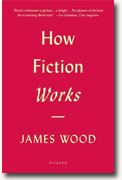How Fiction Works
James Wood
book reviews:
· general fiction
· chick lit/romance
· sci-fi/fantasy
· graphic novels
· nonfiction
· audio books
· author interviews
· children's books @
curledupkids.com
· DVD reviews @
curledupdvd.com
newsletter
win books
buy online
links
home
for authors
& publishers
for reviewers

 |
How Fiction Works James Wood Picador Paperback 288 pages July 2009 |
|
Titling a work of literary criticism “How Fiction Works” is a confident and aggressive act that leaves the author wide open to accusations of hubris, arrogance, and worse. Of course, these accusations would only come about if How Fiction Works
These are questions we tend to answer as we read a novel, as we learn the best way to approach the work. A novel of Kafka's, say, is less concerned with the personality of the character than the irony and metaphor of his situation, bleak and grim as it usually is. On the other hand, the Rabbit series by John Updike lives and dies on the strength of its central character, Harry 'Rabbit' Angstrom. This is not something we know before we read the work – it comes to us as we turn the pages. What James Wood is attempting to do is to explicate this process for us. He draws from a backlog of well-established masters of fiction, using quotes and examples to show us how these authors taught us how to read them. Wood begins a chapter by writing that 'Novelists should thank Flaubert the way poets thank spring: it all begins again with him.’ He attributes the invention of 'free indirect' writing to Flaubert, and reckons that it has gone on to influence most of modern fiction. Wood provides crude examples of his own to explain free indirect writing – which is essentially a marriage of the author's word choices and grammatical structure, with the characters themselves coloring the text. An early example he provides is “Ted watched the orchestra through stupid tears.” The sentence, he explains, is the author's – but the word 'stupid' is the character's. Another example has a character of Nabokov reaching for a nutcracker as it falls into a sink of water, but the 'leggy thing' slips out of his grasp. 'Leggy' is Nabokov's word, but 'thing', in all its imprecise vagueness, is the character’s. Free indirect style allows the strength of the character to combine with the strength of the author. We learn more about both through this style than we do if we were to read purely through the lens of the author or just the character. Wood spends a great deal of How Fiction Works Once this is out of the way, we are taken through a tour of the bedrock elements of fiction. These are all handled ably, with many excellent examples of the very best writing literature has to offer. While these chapters run the risk of being dry and academic, Wood's exuberance and sheer love for literature make them – as well as the rest of the book – a joy to read. He is a reader on whom nothing is lost, to paraphrase Henry James, and his understanding of the subtleties of literature encourage and invigorate his readers to do the same. Wood is able to clearly and intelligently explain just why it is important that these works are read, and shows the benefits of careful, attentive reading. The last third of the book presents the culmination of How Fiction Works James Wood's clear eye for fiction provides inspiration and encouragement to read more, and better. He writes, 'I think that novels tend to fail not when the characters are not vivid or deep enough, but when the novel in question has failed to teach us how to adapt to its conventions, has failed to manage a specific hunger for its own characters, its own reality level.' Wood inspires a level of hunger for the written word that is difficult to explain here and astonishing to contemplate, given that he does it all in two hundred and forty-eight smallish pages. How Fiction Works Originally published on Curled Up With A Good Book at www.curledup.com. © Damian Kelleher, 2008 |
| Also by James Wood: |
|
|
|
 Click here to learn more about this month's sponsor! |
|
| fiction · sf/f · comic books · nonfiction · audio newsletter · free book contest · buy books online review index · links · · authors & publishers reviewers |
|
| site by ELBO Computing Resources, Inc. | |
 In the preface, Wood states the reader's problem with understanding novels. He asks: “Is realism real? How do we define a successful metaphor? What is a character? When do we recognize a brilliant use of detail in fiction? What is point of view, and how does it work? What is imaginative sympathy? Why does fiction move us?” His answers are wrapped around ten chapters and one hundred and twenty-three sections, exploring the fundamental aspects of fiction – character, plot, dialogue, narration, detail, metaphor.
In the preface, Wood states the reader's problem with understanding novels. He asks: “Is realism real? How do we define a successful metaphor? What is a character? When do we recognize a brilliant use of detail in fiction? What is point of view, and how does it work? What is imaginative sympathy? Why does fiction move us?” His answers are wrapped around ten chapters and one hundred and twenty-three sections, exploring the fundamental aspects of fiction – character, plot, dialogue, narration, detail, metaphor.